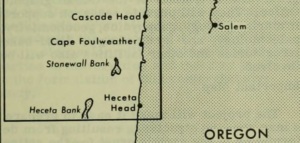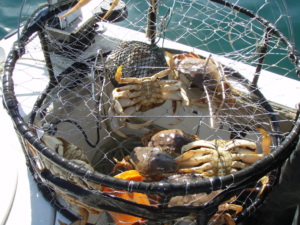
Ian Giancarlo
Former Protect Our Oceans Campaign, Advocate, Environment America
From migrating whales to steep canyons and rocky reefs - Heceta Bank is an underwater treasure, and we should protect it.
Former Protect Our Oceans Campaign, Advocate, Environment America
Nestled off the rugged coast of central Oregon is one of the most unique ecosystems in the Pacific. It’s called Heceta Bank, and we should protect it.
Every year, hundreds of migrating humpback and gray whales travel through this area and above the waves, thousands of albatross and shearwaters prey on fish. On the seafloor, rockfish, sea stars and octopuses traverse the rocky reefs and canyons found here.
Heceta Bank is an underwater formation of canyons and seamounts located approximately 30 miles off the coast of Florence, Oregon. It spans a vast area of about 150 square miles and is situated at the intersection of powerful ocean currents, including the California Coastal Current. The bank’s unique geologic features combined with the intense currents create an intricate landscape that supports a diverse array of marine life, from microorganisms like some algaes all the way up to large marine mammals like whales.

Heceta Bank’s locationPhoto by Internet Archive Book Images | Public Domain
Unfortunately, the beauty of Heceta Bank is at risk.
Heceta Bank faces a myriad of threats that jeopardize the delicate balance of its ecosystem.
As our oceans warm due to the impacts of climate change, the ecosystems that rely heavily on strong ocean currents driven by temperature changes between cooler and warmer water are put under intense pressure. A strong current provides Heceta Bank with much-needed nutrients that sustain life, and without it, this seascape is at risk.
Another big problem driven by climate change is ocean acidification, which is a result of increased carbon dioxide levels in our air. Our oceans are one of nature’s best carbon sinks and are effective at storing carbon. Unfortunately, the more carbon they store, the more acidic the waters become. This is very harmful for shellfish, like Dungeness crab and oysters, because their shells break down rapidly as a result.
Heceta Bank, along with much of Oregon’s ocean, continue to be at risk of hypoxia– low oxygen levels in the water. Warmer temperatures, when combined with the nutrient-rich waters that sustain marine life, create the perfect environment for harmful algal blooms to occur, which in turn deplete surrounding ecosystems of essential oxygen. Without oxygen, Dungeness crab and groundfish populations die off in large numbers. Over time, sustained low oxygen levels can lead to dead zones, which are large areas that are devoid of life. Unfortunately, this problem will only worsen with climate change.

Dungeness crab is one of the most lucrative resources for their fishing industryPhoto by CaliforniaDFW | CC-BY-2.0
Oregon’s fisheries haul in millions of pounds of fish every year. Some of the most popular catches are Dungeness crab and rockfish. Critters like these love making their homes in rocky reefs found in places like Heceta Bank. Sadly, these areas are highly susceptible to bottom-trawling – a fishing practice that involves dragging nets across the seafloor, damaging much of the ecosystem. Because of overfishing, Oregon’s fish populations collapsed in the early 2000’s and scientists estimated that it would take several decades before many species, like rockfish, would recover.
In response, in the mid 2000’s, many of these rocky areas were closed to bottom-trawling by the Pacific Fisheries Management Council. Because of this, fish populations rebounded far sooner than expected. For now, Heceta Bank remains closed to this disastrous fishing practice but it is not guaranteed forever.
It’s clear that Heceta Bank and Oregon’s ocean face threats from multiple sources. The more that we can do to alleviate these stressors, the better off our ocean ecosystems will be. We know that one of the best ways to do this is to permanently protect it.
Working to slow climate change by reducing our reliance on fossil fuels is a critical way we can help the ocean, especially places like Heceta Bank – and Environment Oregon has made tackling climate change a priority. But place-based conservation can also make a big difference. The more we can do to give ecosystems room to adapt to the changing climate and other stressors, the more resilient and healthy they become.
That’s why we’re working to permanently protect Heceta Bank.
The wonders that Heceta Bank offers are endless. It’s one of the most biologically rich areas on our Pacific coast and is home to incredible wildlife like octopuses, sea stars and migrating gray and humpback whales. This, alongside the many threats it faces, make it clear it deserves protection.
There’s still time for the Biden Administration to protect Heceta Bank before the start of 2025. In his commitment to conservation, President Biden set a goal to conserve 30% of our lands and waters by 2030. Protecting this place would contribute to that goal and help make Oregon’s ocean more resilient to stressors like overfishing and climate change, as well as provide a safe-haven for marine animals nearby.
As stewards of our planet, it is our duty to protect and preserve the wonders of our ocean, and to ensure that it endures for generations to come. If there’s support from communities across Oregon, from scientists and researchers, from the ocean-loving community, from tribes and from youth, we can demonstrate broad support for ocean conservation and for protecting special places like Heceta Bank.
The Biden administration still has time to act, but they won’t unless we show our support for Heceta Bank. Sign our petition and join us in calling on the Biden administration to permanently protect this underwater wonderland.
Former Protect Our Oceans Campaign, Advocate, Environment America
I
